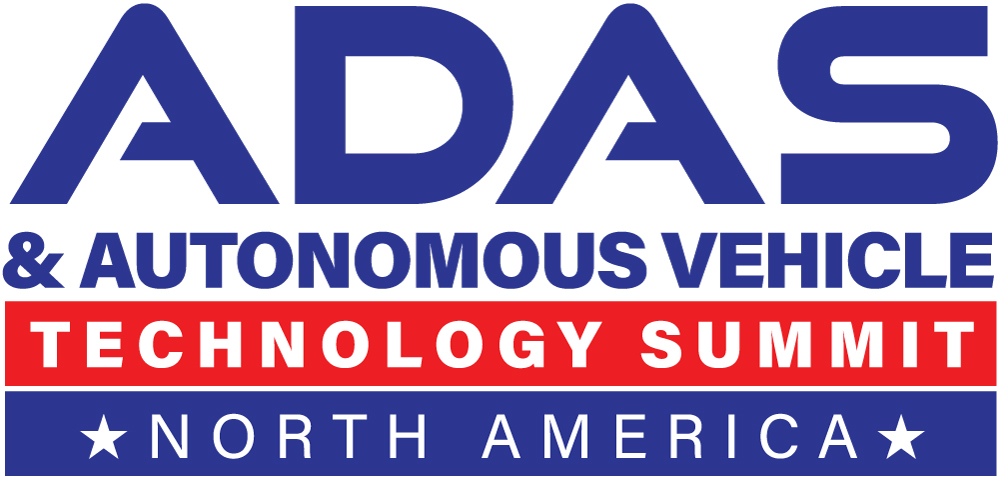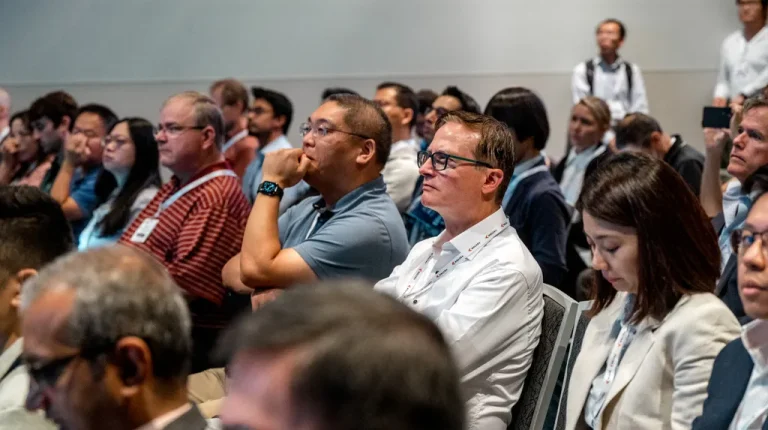Returning to the San José McEnery Convention Center, California, on August 27 and 28, ADAS & Autonomous Vehicle Technology Summit North America 2025 hosted international leaders in automated driving to explore the key topics and products that are accelerating scalable end-to-end ADAS/AV development and deployment, enhanced safety and reduced costs, while complying with standards and stringent regulations.
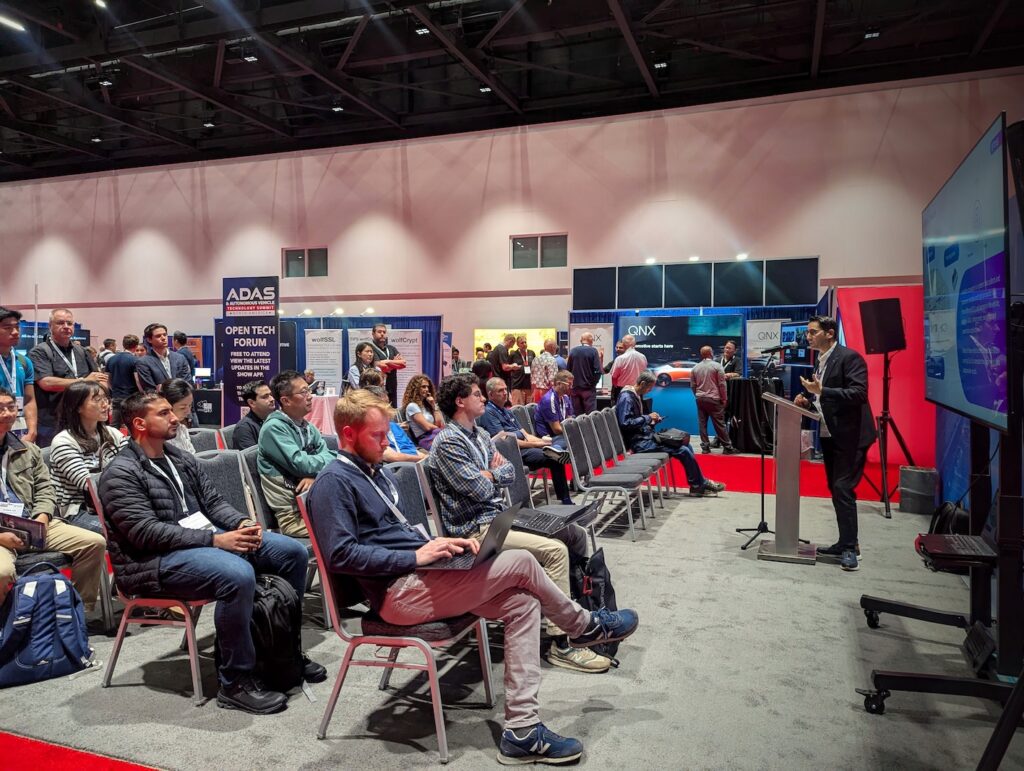 Exciting additions to this year’s event included the free-to-attend Open Tech Forum, where speakers from Deepen AI, Deontic, LDRA, Parallel Domain, Cognata, Gapwaves, ETAS, ARRK and Safety Innovation of the Year award winner HAAS Alert, presented technologies, concepts and strategies. There was also a ‘Specifying an ODD’ workshop led by Edward Schwalb, an expert consultant who supports the development of tooling for operational design domain specification and validation at Volkswagen, and a networking lunch hosted by Women in Automotive Technology (WAT).
Exciting additions to this year’s event included the free-to-attend Open Tech Forum, where speakers from Deepen AI, Deontic, LDRA, Parallel Domain, Cognata, Gapwaves, ETAS, ARRK and Safety Innovation of the Year award winner HAAS Alert, presented technologies, concepts and strategies. There was also a ‘Specifying an ODD’ workshop led by Edward Schwalb, an expert consultant who supports the development of tooling for operational design domain specification and validation at Volkswagen, and a networking lunch hosted by Women in Automotive Technology (WAT).
At the exhibition, visitors kept pace with developments and regulatory changes in a rapidly evolving industry. International suppliers demoed cutting-edge solutions to advance technological innovation and enhance competitive edge, including ADAS/AV software and hardware, processing solutions, testing tools, artificial intelligence and V2V/V2X.
Conference speakers from industry, academia and regulators delivered expert insights on public acceptance and trust; regulatory frameworks and standards; developments in AI, software and data analytics; safety innovations and best practices; connectivity; cybersecurity; and ethical issues. Contributors included Waymo, Plus, Zoox, Carnegie Mellon University, Torc Robotics, Uber, AWS, CA DMV, PAVE, Woven by Toyota, GM and Nissan.
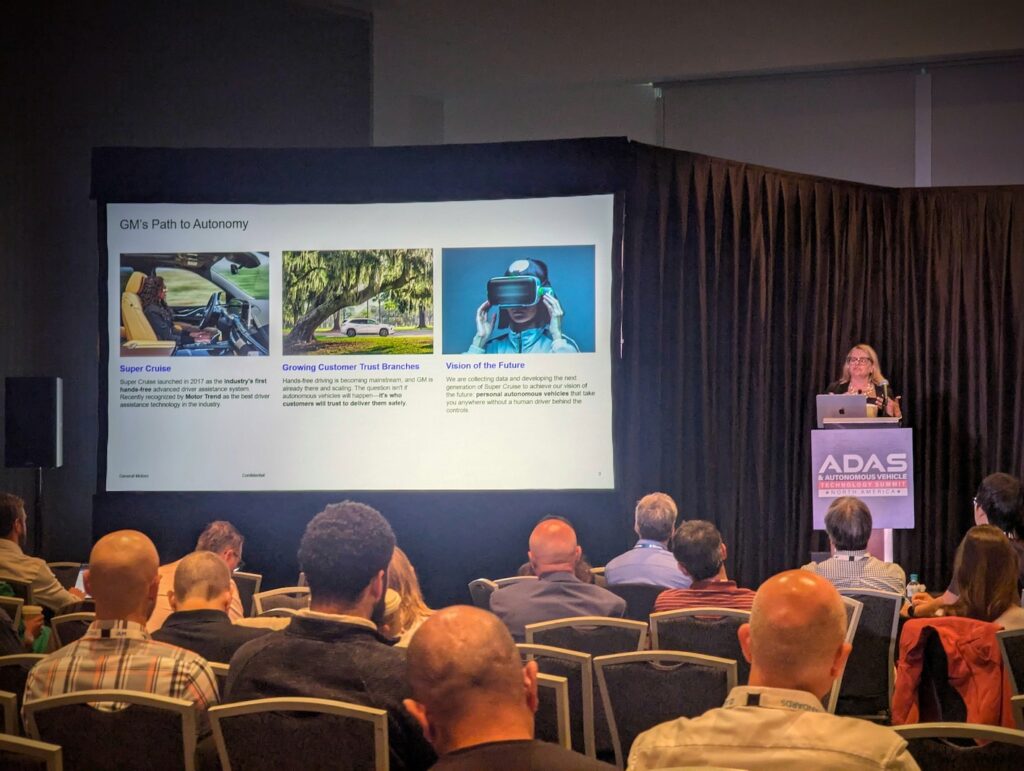 “Discussions have been about the importance of cybersecurity in applications installed on vehicles,” said Jeffrey Numark, VP of growth at RunSafe Security. “There has been an awakening that with all the connected hardware and software, cars are now like computers and need to be treated and protected as such. It’s been an immensely positive experience to speak with vendors and those wanting to integrate software and applications. It is RunSafe’s first time exhibiting, and we’re thrilled to participate. Silicon Valley is the historical heart of the chip industry; unsurprisingly, companies are congregating in San Jose to think about the exciting potential for the powerful hardware in vehicles.”
“Discussions have been about the importance of cybersecurity in applications installed on vehicles,” said Jeffrey Numark, VP of growth at RunSafe Security. “There has been an awakening that with all the connected hardware and software, cars are now like computers and need to be treated and protected as such. It’s been an immensely positive experience to speak with vendors and those wanting to integrate software and applications. It is RunSafe’s first time exhibiting, and we’re thrilled to participate. Silicon Valley is the historical heart of the chip industry; unsurprisingly, companies are congregating in San Jose to think about the exciting potential for the powerful hardware in vehicles.”
Katelyn Magney-Miller, communications director at PAVE, said, “This is the first year PAVE has formally been part of the show, where we organized a panel discussion on building public trust. This conference is a fantastic venue for technical conversations, but introducing discussions around building trust is critical to move the industry forward. This has been an exciting year for autonomous vehicles and the ADAS world, which is reflected in the conversations that I’ve had. There’s a lot of energy around AVs/ADAS and new and emerging solutions, so it’s been exciting to be here and network with so many thought leaders.”
“My presentation focused on California’s regulatory framework for manufacturers: where we started, where we are today and where we are heading,” explained Miguel Acosta, chief of autonomous vehicles at the California Department of Motor Vehicles. “The show in San Jose is perfect, as many manufacturers testing this technology are here in California and Silicon Valley. California plays a unique role in regulating autonomous technology, but we also work with NHTSA and other states to understand how they work on autonomous technology. In addition, we receive delegates from other countries to better understand how autonomous technology is tested and regulated. This is my third time speaking here, and it’s important because regulations and policies are consistently evolving, and we want to provide our stakeholders with up-to-date information. We’re really looking forward to future shows. Feedback has been great; I’ve received questions from manufacturers and other stakeholders in the space.”
“Attending and speaking was an outstanding experience,” said Anurag Paul, staff machine learning engineer at Plus. “It was a pleasure to present to such an engaged and knowledgeable audience. Thoughtful questions from the audience and moderator made for a dynamic session. The summit provided excellent opportunities for networking with industry experts. I highly recommend this conference to anyone in the autonomous vehicle space.”
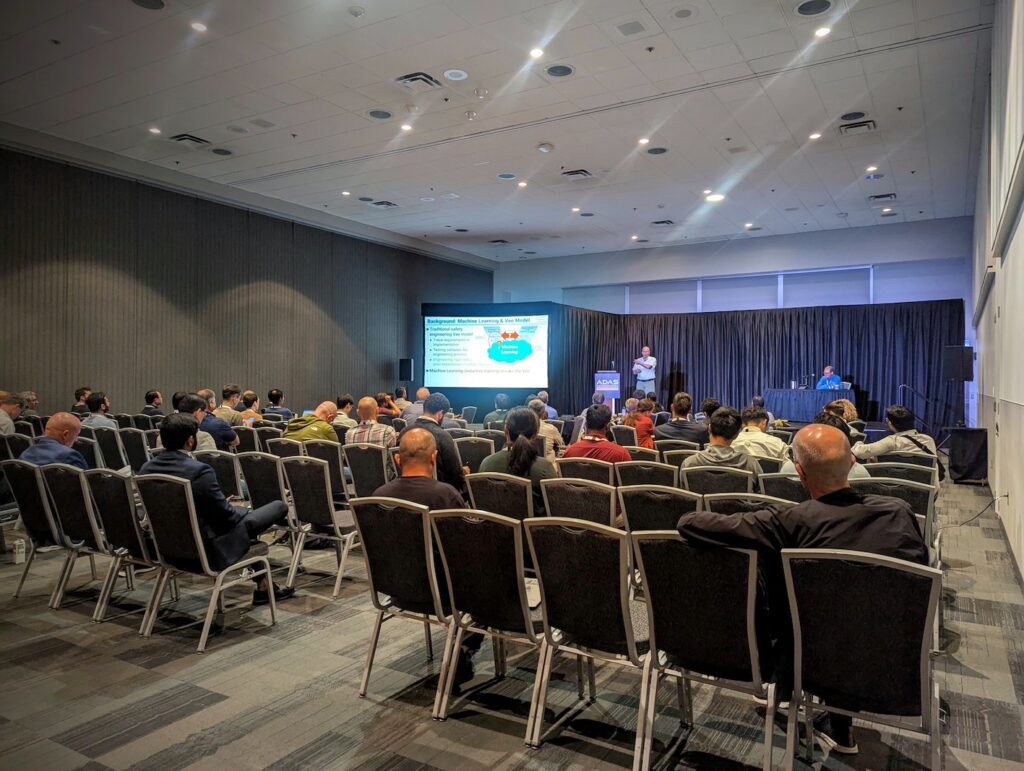 Philip Koopman (above), emeritus professor in electrical and computer engineering at Carnegie Mellon University, said, “This event has significant industry participation, which is great because I can connect with those operating and designing these vehicles. I’ve discussed self-driving car safety with regulators and consumer advocates. I’m happy to speak in Stuttgart and San Jose on the breadth and detail covering safety. In Germany, engineers require approval to go on the road. However, anyone can go on the road in the US, so long as they check a few simple boxes. It’s a change in perspective, although lawsuit exposure is much higher here, so it’s a trade-off. The audience starts from different places, but they all need public acceptance – having a robust understanding of safety is required to achieve this long-term. What I like about this show is it’s a great opportunity to see what different companies are doing in California.”
Philip Koopman (above), emeritus professor in electrical and computer engineering at Carnegie Mellon University, said, “This event has significant industry participation, which is great because I can connect with those operating and designing these vehicles. I’ve discussed self-driving car safety with regulators and consumer advocates. I’m happy to speak in Stuttgart and San Jose on the breadth and detail covering safety. In Germany, engineers require approval to go on the road. However, anyone can go on the road in the US, so long as they check a few simple boxes. It’s a change in perspective, although lawsuit exposure is much higher here, so it’s a trade-off. The audience starts from different places, but they all need public acceptance – having a robust understanding of safety is required to achieve this long-term. What I like about this show is it’s a great opportunity to see what different companies are doing in California.”
“More than 50% of our members are participating, so we are happy to come here,” said Marius Dupuis, CEO at ASAM. “As a proud sponsor, it’s a good way to connect, see new technologies and where standardization needs to go. I am also speaking about the full range of our standards; if you want to scale or roll out your technology, there is hardly any way around standardization. It’s also a great opportunity to host our meetup with Deepen AI and Autoware.”
“We’re connecting with many customers in the valley on the AI and autonomy side,” revealed Mohammad Musa, founder and CEO at Deepen AI. “The show’s location is next to home, so it’s convenient to connect with people. We go far back with this show – I started attending as a panel speaker in Novi in 2018, before exhibiting in Stuttgart in 2019. We worked with the team to start the California event. Each show has its own value and we’ve exhibited here for the past few years.”
“It’s been a great honor to be hosted by the ADAS and autonomous show, who sponsored our lunch,” enthused Linda Campbell, president at WAT. “We had 40 women attend, many meeting for the first time. There were plenty of conversations about technology, and that’s what we’re all about – how we amplify women to help drive the technology forward. Our partnership with the show will help us do that. We’re looking forward to next year, as we hope to put together a panel; ADAS is an important part of our technology portfolio.”
Exhibition highlights
Industry experts were on hand from Segments.AI, Oxford Technical Solutions, Xylon, RunSafe Security, Rohde & Schwarz, LaVision, AB Dynamics, Deepen AI, GeneSys, Business Sweden, Deontic (below) and many more.
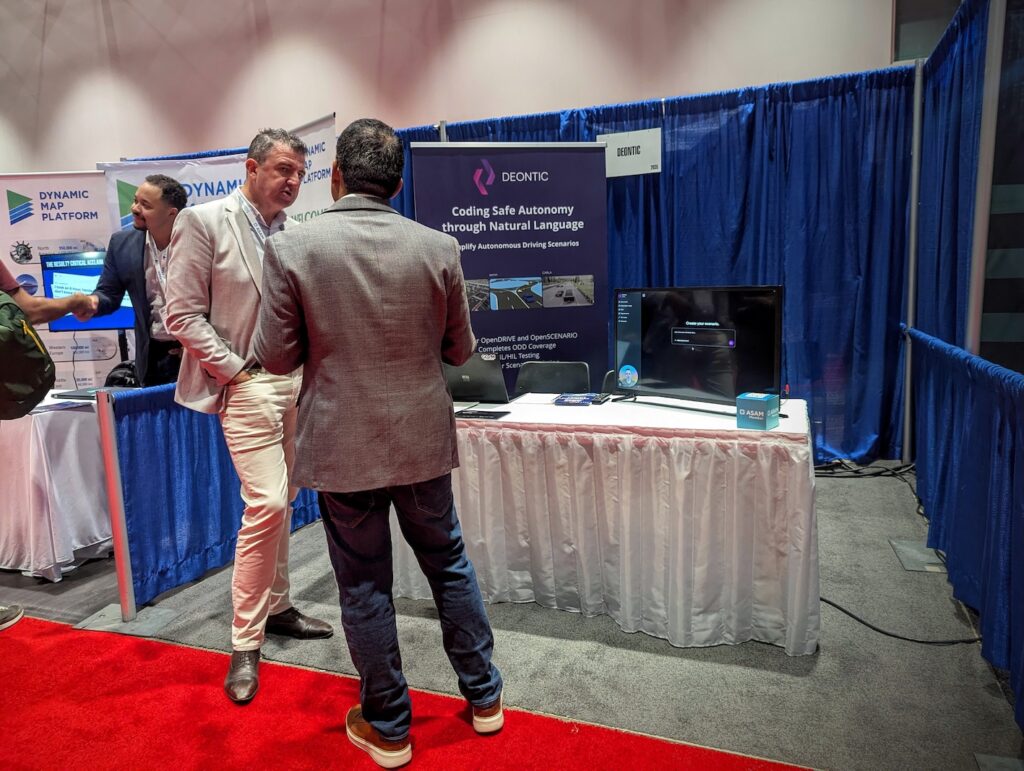 Highlights included Deontic’s GenAI validation platform, which transforms natural language requirements into validated test scenarios. It cuts validation time by 80% and costs by 90%, while ensuring regulatory compliance and seamless integration with simulators and digital twins. Stephen Lernout, co-founder and CEO, Deontic, said, “We’re seeking feedback from OEMs, Tier 1s and regulators on pain points in scaling across ODDs, integration needs and regulatory acceptance of AI-driven validation. The automated driving sector is shifting from R&D to regulatory readiness and commercialization. In North America, key trends include rising demand for scalable safety validation, pressures for regulatory harmonization and cost reduction through automation.”
Highlights included Deontic’s GenAI validation platform, which transforms natural language requirements into validated test scenarios. It cuts validation time by 80% and costs by 90%, while ensuring regulatory compliance and seamless integration with simulators and digital twins. Stephen Lernout, co-founder and CEO, Deontic, said, “We’re seeking feedback from OEMs, Tier 1s and regulators on pain points in scaling across ODDs, integration needs and regulatory acceptance of AI-driven validation. The automated driving sector is shifting from R&D to regulatory readiness and commercialization. In North America, key trends include rising demand for scalable safety validation, pressures for regulatory harmonization and cost reduction through automation.”
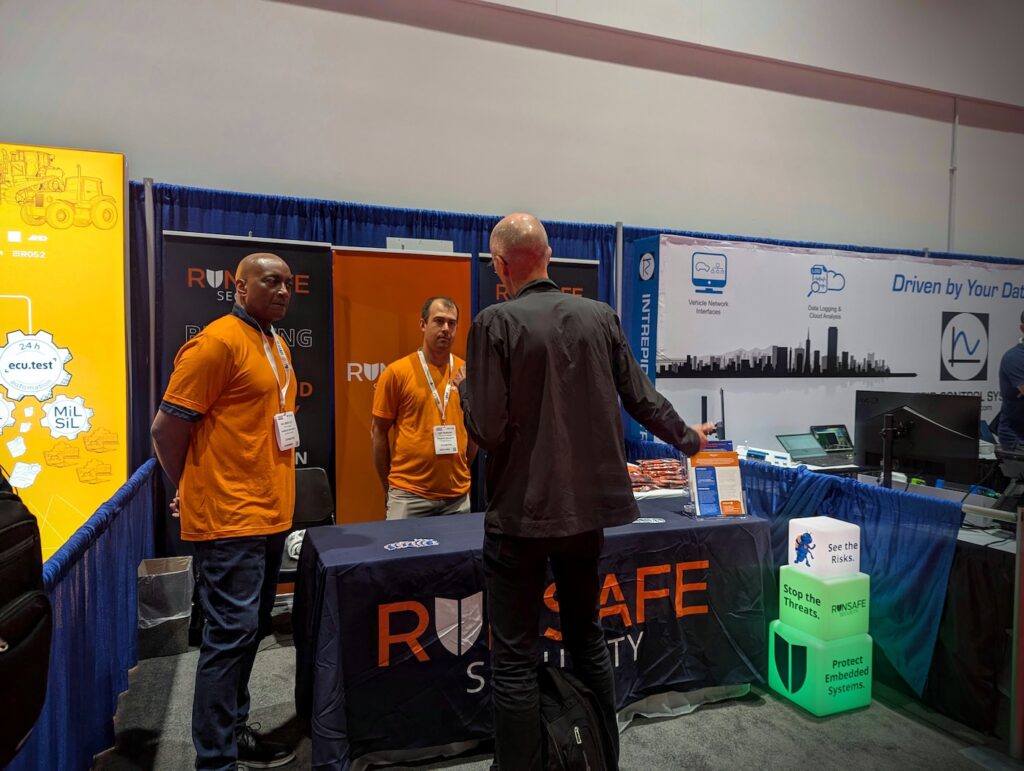 Cybersecurity specialist RunSafe Security shared its 2025 Connected Car Cyber Safety & Security Index report – which surveyed 2,000 connected car owners from the USA, UK and Germany and revealed that that consumer awareness of cybersecurity has transformed it from a technical afterthought into a decisive factor in purchasing decisions – and spoke about its Risk Reduction Analysis solution, which uncovers risks in software supply chains.
Cybersecurity specialist RunSafe Security shared its 2025 Connected Car Cyber Safety & Security Index report – which surveyed 2,000 connected car owners from the USA, UK and Germany and revealed that that consumer awareness of cybersecurity has transformed it from a technical afterthought into a decisive factor in purchasing decisions – and spoke about its Risk Reduction Analysis solution, which uncovers risks in software supply chains.
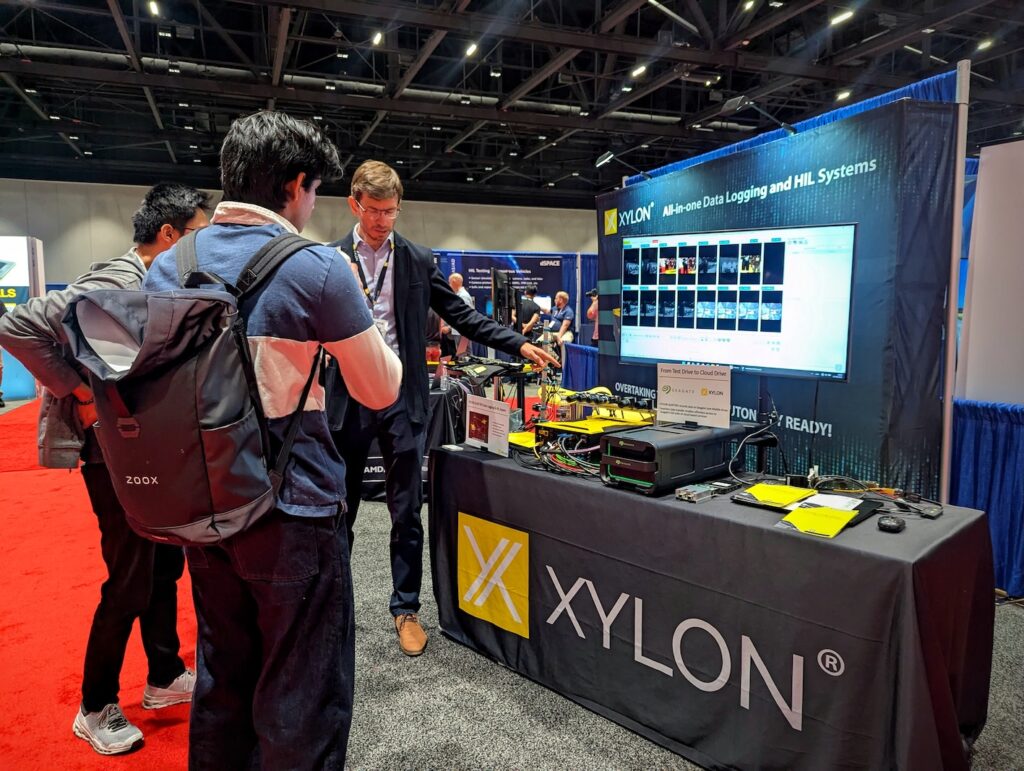 Xylon demoed its HIL test bench for ZF’s forward-facing Smart Camera 6 and the Xylon Quattro with Seagate Lyve Mobile Array integration. Gordan Galic, technical marketing director at Xylon, said, “We’re showcasing examples developed with and for industry leaders. Our goal is to inspire attendees with ideas on how these technologies can be applied in their validation workflows – whether in simulation, datalogging or seamless cloud integration.”
Xylon demoed its HIL test bench for ZF’s forward-facing Smart Camera 6 and the Xylon Quattro with Seagate Lyve Mobile Array integration. Gordan Galic, technical marketing director at Xylon, said, “We’re showcasing examples developed with and for industry leaders. Our goal is to inspire attendees with ideas on how these technologies can be applied in their validation workflows – whether in simulation, datalogging or seamless cloud integration.”
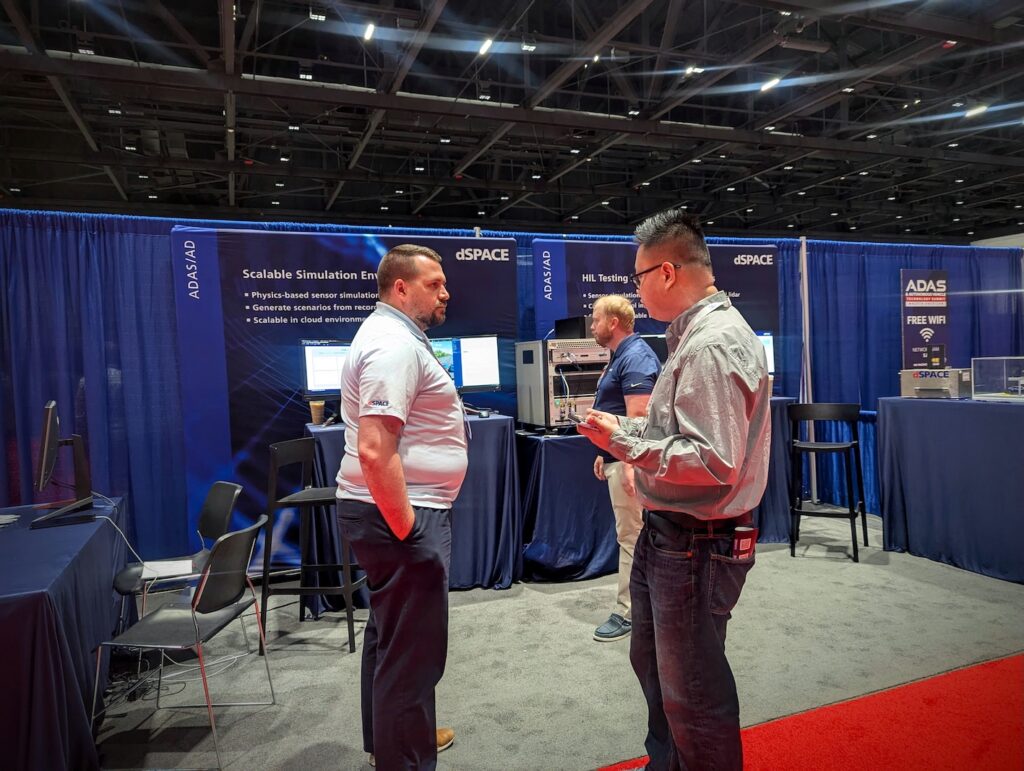 The highlight of dSPACE’s display was a 24/7 night-time driving hardware-in-the-loop simulator, leveraging the company’s ESI and Aurelion tools to enable sensor-accurate validation in low-light conditions. “We’re looking for feedback on night-time driving HIL scenario realism, application use cases and how this approach can streamline validation pipelines,” said Chris Manning, manager of autonomous driving and software engineering at dSPACE.
The highlight of dSPACE’s display was a 24/7 night-time driving hardware-in-the-loop simulator, leveraging the company’s ESI and Aurelion tools to enable sensor-accurate validation in low-light conditions. “We’re looking for feedback on night-time driving HIL scenario realism, application use cases and how this approach can streamline validation pipelines,” said Chris Manning, manager of autonomous driving and software engineering at dSPACE.
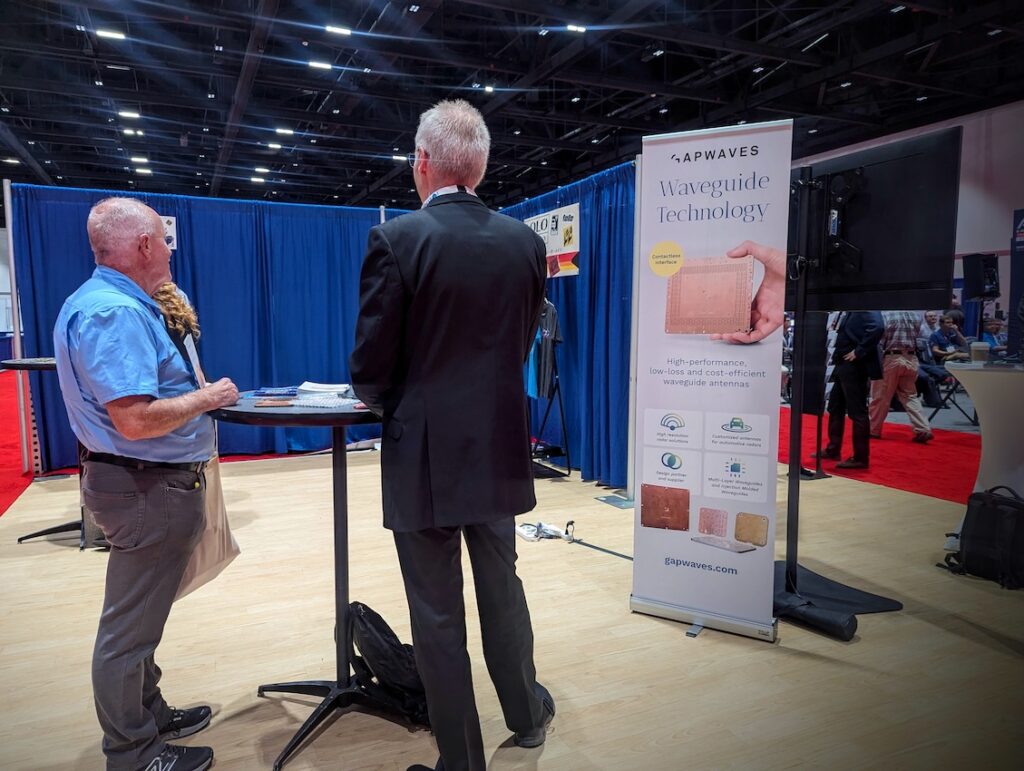 Gapwaves showcased its waveguide antennas to improve radar sensor performance, produced in response to the growing variety of automated driving applications in North America, with growing focus on commercial and off-road capabilities. Gapwaves CEO Jonas Ehinger said, “It’s always inspiring to visit the ADAS & Autonomous Vehicle Technology Summit and the Bay Area in general. Here we can interact with startups and established players with a wide variety of applications.”
Gapwaves showcased its waveguide antennas to improve radar sensor performance, produced in response to the growing variety of automated driving applications in North America, with growing focus on commercial and off-road capabilities. Gapwaves CEO Jonas Ehinger said, “It’s always inspiring to visit the ADAS & Autonomous Vehicle Technology Summit and the Bay Area in general. Here we can interact with startups and established players with a wide variety of applications.”
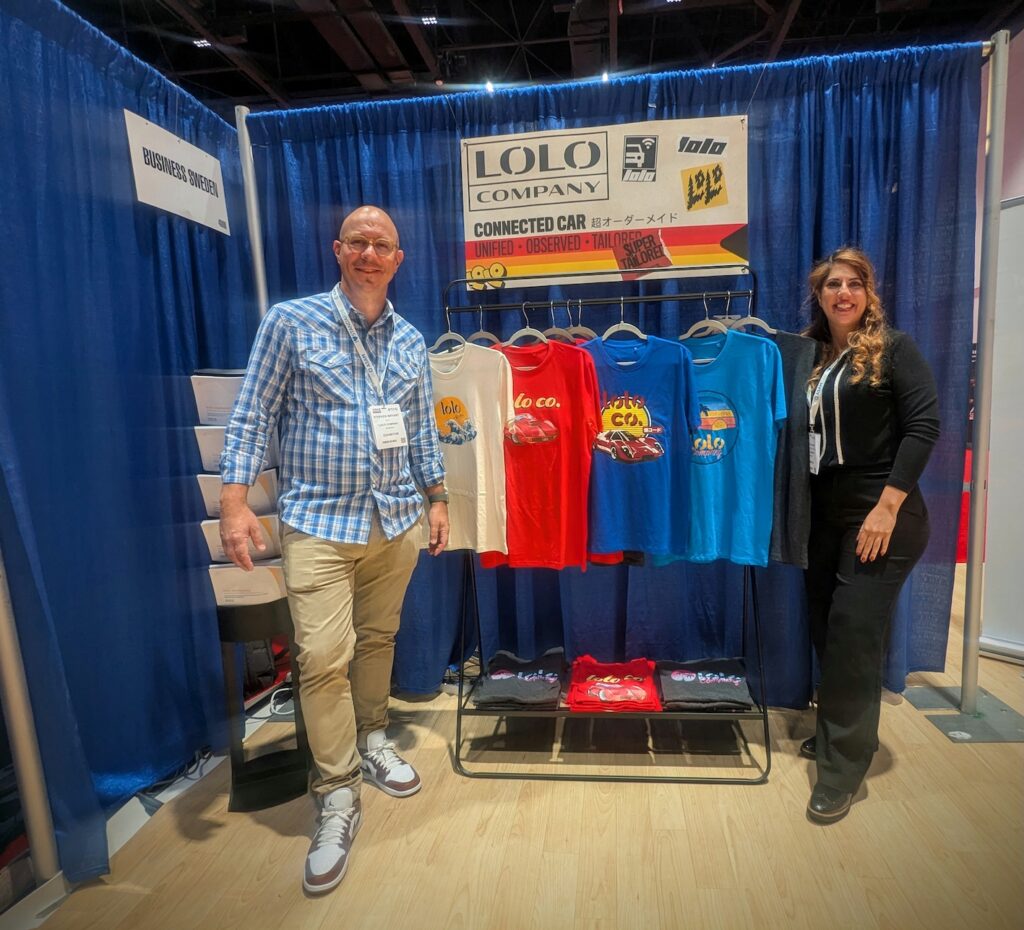 Attendees to Lolo’s booth learned about Unify Lolo, a managed, software-defined overlay network built to connect and manage business-critical, distributed assets at scale. Running on CDN partner infrastructure across 70 data centers, and integrated with 11 operator networks (40+ APNs) worldwide, Unify supports any provider via standard protocols and cloud connects, streaming over 15 billion analytics events daily and petabytes of monthly traffic.
Attendees to Lolo’s booth learned about Unify Lolo, a managed, software-defined overlay network built to connect and manage business-critical, distributed assets at scale. Running on CDN partner infrastructure across 70 data centers, and integrated with 11 operator networks (40+ APNs) worldwide, Unify supports any provider via standard protocols and cloud connects, streaming over 15 billion analytics events daily and petabytes of monthly traffic.
Conference
The main conference featured sessions covering AI, software and architecture; safety innovations and best practices; developments in ODDs; as well as real-world, proving ground and virtual testing. Delegates heard from Plus, Tata Technologies, Rohde & Schwarz, General Motors, Zeekr Technology Europe, the California DMV, the Nissan Advanced Technology Center Silicon Valley (NATC-SV), Zoox, ASAM e.V., Microsoft, Torc Robotics, Woven by Toyota and Foretellix.
As autonomous vehicles move from pilots to real-world deployment, Here Technologies showcased how its dynamic location platform integrates sensor fusion, real-time updates and AI-powered mapping to enable safe, scalable autonomous navigation. Robosense discussed why lidar is scaling faster in China than anywhere else – and what global OEMs can learn from its regulatory, consumer and integration models – and Zeekr’s keynote explored how China, Germany, the UK and the USA are pioneering harmonized legal standards that define operational domains, liability, cybersecurity and remote monitoring for Level 4 autonomy, to unlock scalable, trustworthy robotaxi deployment worldwide.
Addressing safety and public acceptance, Waymo gave a presentation titled ‘Waymo Driver safety and deployment readiness – methodologies and criteria for absence of unreasonable risk’, while Woven by Toyota delved into evolving safe mobility and GM discussed safety considerations for personal autonomous vehicles (PAVS).
QNX showed how safety and security are key to increasing public perception of autonomous vehicles, while ETAS presented on “recomputability for safe and secure ADAS”, and TÜV Rheinland of North America gave a practical example of how to prevent an ADAS AI/ML poisoning attack using ISO TR 5469.
The evolving legal landscape for connected vehicle data was explored in Honigman’s presentation, ‘Biometrics to geolocation: sensitive data in connected and autonomous vehicles,’ addressing privacy risks, cybersecurity threats and compliance strategies under state/federal laws. Attendees gained actionable insights into balancing innovation with regulatory demands, mitigating enforcement risks and implementing industry privacy principles.
A panel discussion on AVs and public acceptance considered how engineers can ready the public for widespread deployment. Katelyn Magney-Miller, head of communications at Partners for Automated Vehicle Education (PAVE) moderated, with panelists including Francesca Favarò, head of safety best practices at Waymo; Dave Tokic, VP of corporate development at Torc Robotics; and Stephen Hayes, VP of autonomous fleets and driver ops at Lyft. Rather than simply writing the code and not seeing the implementation, the panelists encouraged engineers to be part of the dialog by experiencing the vehicles themselves, for instance taking a ride to see how the technology is (or is not) functioning in various environmental conditions. Attending events to speak with the public is a great way to demystify preconceptions or anxieties about safety and is also empowering as it gives engineers ownership of their work. And of course, without public acceptance or trust, there will be no autonomous vehicles.
Next year’s dates
Look out for some exciting announcements in the coming days and, in the meantime, please visit the ADAS & Autonomous Vehicle Technology Summit North America website for more of this year’s highlights.
